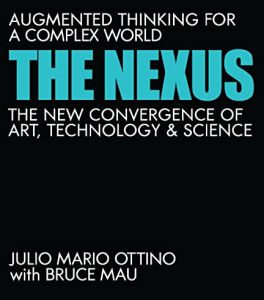Join getAbstract to access the summary!

Join getAbstract to access the summary!
Julio Mario Ottino and Bruce Mau
The Nexus
Augmented Thinking for a Complex World – The New Convergence of Art, Technology & Science
MIT Press, 2022
What's inside?
The existential problems facing humanity require complex solutions, generated in a cross-disciplinary idea space that supports left- and right-brain thinking.
Recommendation
Humanity faces massively complex problems on a global scale today, ranging from epidemics to environmental degradation. These problems demand complex, coordinated solutions, explain Julio Mario Ottino and Bruce Mau. Throughout history, moments of “genius” and periods marked by innovation, creativity and discovery, such as the Italian Renaissance, have occurred when ideas and practitioners from the arts, sciences and technology cross-pollinated. Drawing inspiration from diverse disciplines such as painting and quantum physics, Ottino and Mau call on innovators to find a shared language with which to tackle the challenges and complex problems the world faces today.
Summary
About the Authors
Founding co-director of Northwestern University’s Institute on Complex Systems Julio Mario Ottino is a Guggenheim Fellow. Designer and educator Bruce Mau is CEO of the design consultancy Massive Change Network.




















Comment on this summary